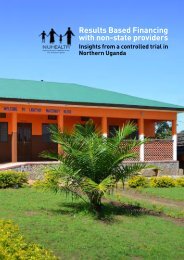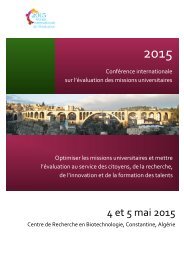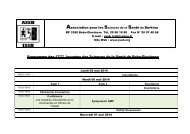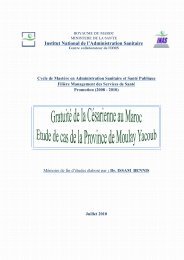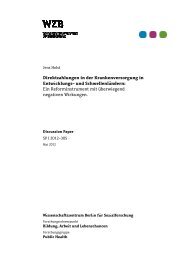Bellagio-Report-Vs-Apr-14
Bellagio-Report-Vs-Apr-14
Bellagio-Report-Vs-Apr-14
Create successful ePaper yourself
Turn your PDF publications into a flip-book with our unique Google optimized e-Paper software.
PAPER 2 - BRINGING ABOUT INFLUENTIALEVALUATION FOR AFRICAN DEVELOPMENT: THE ROADFORWARDContributors - Doha Abdelhamid, Laila El Baradei, Debbie Serwadda, Nermine WallySTATEMENT: The cause of development evaluation rests on the development of genuine developmentstrategies reflecting the needs of stakeholders who should own and be engaged in visioning andimplementation of development and the respective DME evaluation discourse.The contributors to this paper are aware of a number of considerations:• This paper is highly dependent on the discourse evolving from earlier trigger papers, same forthe contributions that are currently being generated by other position papers• The immediacy of development adjoined to development evaluation is imperativeLiterature messages drawn from Rob Moore's and Zenda Ofir's trigger paper:• The mastery of critical M&E approaches and methods• Innovation in monitoring and evaluation theory and practice• Positioning the evaluation profession and globallyWhat strategies or activities for joint action could be considered?Expand the pool of evaluation knowledge generated within Africa1. Generate, compile and classify a transparent repository of knowledge on African evaluations2. Mapping capacity building initiatives in DME within Africa3. Moving the compiled repositories and maps to the wider African public4. Gauging demand from specialist universities, think tanks and DME projects to partner forgenerating original knowledge drawing lessons learnt and best practices on the theory,perception and application of DME in Africa5. Documenting and disseminating results in fora and building national and sub-national DMEaction research plans to improve the evaluation status6. Documenting and disseminating intra-national, regional action research results7. Documenting and disseminating continental action research resultsEquitable stakeholders participation has to be secured in all phases of the above action plan.Catalyze a strong, movement towards 'thought leadership' within the evaluation profession inAfricaThe civil society should play a leading role in canvassing ideas and fostering thought leadership indevelopment evaluation by acting as a broker of evaluative knowledge among the general public,government, evaluation practitioners, parliamentarians, the media/press, private sector, political partiesand development partners.Such movements require a non for profit actor, therefore the DME civil society stand as well-suited inthis regard. A continuous policy dialogue should take place through a DME civil society leader tospearhead through planned series of fora within a liberal thinking space to improve the realizeddevelopment results nationally, regionally, continentally and internationally.This policy dialogue should ensure infilterment into national policies and the embedment ofinstitutionalized, sustainable systems in governments that would realize development for the Africanpeople.The output, henceforth, would be an Africa-owned overarching vision for development anddevelopment evaluation.African Thought Leaders Forum on Evaluation and Development, <strong>Bellagio</strong>, Nov 2012 48



